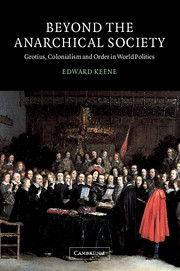Book contents
- Frontmatter
- Contents
- Preface
- Acknowledgements
- Introduction
- 1 The orthodox theory of order in world politics
- 2 The Grotian theory of the law of nations
- 3 Colonialism, imperialism and extra-European international politics
- 4 Two patterns of order in modern world politics: toleration and civilization
- 5 Order in contemporary world politics, global but divided
- Conclusion
- Bibliography
- Index
Introduction
Published online by Cambridge University Press: 22 September 2009
- Frontmatter
- Contents
- Preface
- Acknowledgements
- Introduction
- 1 The orthodox theory of order in world politics
- 2 The Grotian theory of the law of nations
- 3 Colonialism, imperialism and extra-European international politics
- 4 Two patterns of order in modern world politics: toleration and civilization
- 5 Order in contemporary world politics, global but divided
- Conclusion
- Bibliography
- Index
Summary
This book is about the patterns of political and legal order that have characterized international relations since the seventeenth century. On seeing that opening statement, one might well expect a large part of the book to be devoted to explaining how the modern world came to be organized as a ‘Westphalian system’, or to the closely related idea that modern states collectively form an ‘international society’ that preserves their mutual independence and maintains a degree of peaceful coexistence in their relations with one another. It would also be perfectly reasonable to expect my analysis to go on to ask whether or not this society of states can provide for justice in the world today; or how international relations are presently being transformed as a result of the emergence of a quite different kind of ‘post-Westphalian’ order that is founded on new normative principles and embodied in new international legal rules and institutions.
But these are well-trodden paths and I do not intend to go down them again, other than to say where I think they are misleading. We already have a shelf-full of excellent books on the international society of sovereign states, of which one of the best contemporary works, certainly one of the most lucid, is Hedley Bull's hugely influential account of The Anarchical Society. I will pay a considerable amount of attention to how Bull's argument was put together, but it would hardly be worthwhile just to repeat what he has already said about order in the modern society of states, even with the addition of a few extra historical, philosophical or sociological flourishes to give his vision of the anarchical society a little more depth.
- Type
- Chapter
- Information
- Beyond the Anarchical SocietyGrotius, Colonialism and Order in World Politics, pp. 1 - 11Publisher: Cambridge University PressPrint publication year: 2002
- 2
- Cited by

